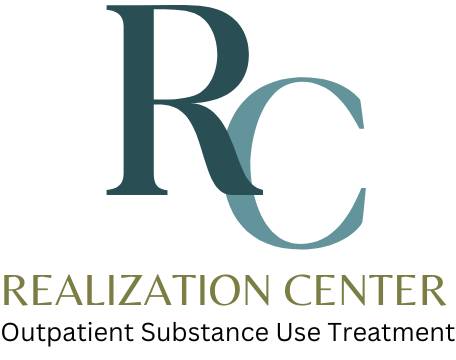Food Addiction Program
Realization Center is a recognized leader in the treatment of chemical dependency and food addiction. Since, its beginning in 1984, Realization Center has treated thousands of clients who suffer from binge eating disorders, bulimia and anorexia, as well as substance abuse.
Particularly sensitive to special groups of people whose treatment needs have been misunderstood, Realization Center provides a safe, warm and completely confidential environment in which to begin the process of recovery.
What Is Food Addiction?
Pathologically pursuing pleasure/reward by engaging in repeated unmanageable episodes of overeating, undereating and/or eating/purging to the point that it injures health and/or interferes with social, economic, or emotional functioning. It manifests in the forms of compulsive eating, binge-eating, bulimia and/or anorexia, all forms of the same addiction.
Food addiction is similar to drug and alcohol addiction. For a food addict, refined sugar, sugar substitutes, flour and fats become what alcohol is to the alcoholic, or cocaine to the cocaine addict. When eating foods in these categories, the addict sets in motion the “phenomenon of craving”.
Like the drug addict, the food addict may experience withdrawal symptoms when attempting to cut down on foods that trigger cravings. These symptoms may include, but not limited to: cravings, sleep and digestive disturbance, irritability, mood swings, difficulty in focusing.
Characteristics Of Food Addiction
-
1. Craving
Craving is a biological, physiological phenomenon. Once “pleasure foods” (brain reward) are eaten, although personal judgment demands restraint, a physical need to eat has been created, which negates the power to make a decision to stop.
-
2. Preoccupation/Obsession
Obsessed by a remembered sense of pleasure and/or comfort associated with food, the addict becomes preoccupied with “Where is food?” “How soon can I get it?” “Will there be enough?” “How can I stop?”. It persists until the compulsion takes over, which is acting on the obsession.
-
3. Compulsion
Eating results in a cycle of bingeing in spite of the intellectual judgment of the individual or of negative consequences.
-
4. Lack of control
Once the craving has been triggered and preoccupation/obsession follows, and is acted out compulsively, the food addict is rendered powerless to set limits on his/her eating behavior. It is “Appetite unchecked by knowledge”.
* Food addiction manifests in different ways, each with specific symptomology.
Food Addiction Categories
Individuals with binge eating disorders often find that their eating and/or weight interferes with relationships, work and self-esteem. Due to repeated efforts to control their food intake, they may also give up all dieting efforts, thus becoming depressed and anxious.
Symptoms specific to binge eating may include, but are not limited to:
- Recurrent episodes of binge eating
- Lack of control over eating
- Eating when not physically hungry
- Feels disgusted and/or guilty after a binge episode
- Depression
- Isolation
- Frequent attempts and failures at weight loss
- Eating large amounts of food throughout the day
- Eating very rapidly
* Compulsive/binge eaters experience a secret sense of hopelessness.
Services Provided
We, at Realization Center, believe that problematic eating is addictive, progressive, and a potentially fatal disease that requires a comprehensive approach. Clients realize after years of failed attempts, that diets and/or starvation do not work, and that professional help is needed.
At Realization Center, men and women who suffer from food addiction are introduced to an evidence-based recovery program that works. Prompted by a growing awareness of the extent and severity of the food addiction issue and the lack of effective treatment, we made a decision to become a significant force in the solution to this problem. Drawing from our lengthy and successful experience in addiction treatment, we determined to develop the finest, most effective program possible for the treatment of binge eating, bulimia and anorexia.
Because each person is a unique individual, a comprehensive treatment plan is designed to meet his or her specific needs. Each client is involved in a process of recovery which addresses the physical consequences, emotional pain and feelings of spiritual emptiness that accompany the disease of food addiction. This process guides the client in recognizing, admitting and accepting the reality of his/her food addiction.
Since Realization Center recognizes that food addiction is a biological, psychological and social illness, we understand that the addiction model of treatment is the successful approach. Addressing biology first, Realization Center introduces its’ prescribed food plan, TRUE RECOVERY FROM FOOD ADDICTION, which excludes those foods that trigger the disease cycle. We believe that food recovery is the basis of all recovery. Additionally, behavior changes in the areas of eating are recommended to enhance recovery.
TREATMENT GOALS:
Men, women and adolescents in our program learn that weight is not the issue, but rather a symptom of their disease. The safe, supportive environment provides them the opportunity to explore their feelings, particularly anger and shame, and begin to deal with issues such as body image, post-traumatic stress issues, relationships and family systems.
A series of lectures and group workshops provide formal instruction on such issues such as The Disease Concept, What is Abstinence?, Denial, Compliance vs. Surrender, Relapse Prevention, Assertiveness, Self Esteem, Medical Aspects of the Disease and Family Dynamics and Communication. Lectures are presented by a leader in the field of addiction, Dianne Schwartz, CASAC.
CENTER HOURS
Realization Center provides clinical service six days a week. Hours Monday through Friday are 8:30AM until 9:00PM. On Saturday the Center is open from 9:00AM to 2:00PM.
